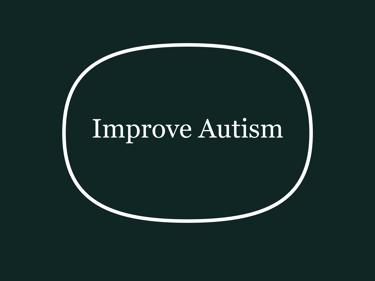The therapeutic effects of probiotics on core and associated behavioral symptoms of autism spectrum disorders: a systematic review and meta-analysis
Authors:
Lee, J.C., Chen, C.M., Sun, C.K., Tsai, I.T., Cheng, Y.S., Chiu, H.J., Wang, M.Y., Tang, Y.H. and Hung, K.C
Summary of study
This meta-analysis of 10 RCTs with 522 participants found that probiotics, particularly multiple-strain formulations, significantly improved overall behavioral symptoms and adaptation in individuals with autism after 4 to 24 weeks. There was also a trend toward reduced anxiety, though not statistically significant. However, probiotics had no effect on core autism symptoms like repetitive behaviors or social communication deficits. While safe and easy to use, the benefits are tempered by inconsistent formulations, limited evidence, and unanswered questions about GI influences and mechanisms. Further research is needed to refine their application in autism treatment.
Overall Findings
The study examined whether probiotics could alleviate both the core symptoms (e.g., repetitive behaviors, social communication difficulties) and associated symptoms (e.g., anxiety, irritability) of ASD. The key findings are:
Primary Outcome: Probiotics significantly improved overall behavioral symptoms of ASD compared to controls (standardized mean difference, SMD = -0.19, p = 0.03). However, there was no significant improvement in the core symptoms of ASD, such as repetitive restricted behaviors (RRB), social behaviors, or communication.
Subgroup Analysis: The improvement in overall behavioral symptoms was significant only in studies using multiple-strain probiotics (SMD = -0.26, p = 0.03), not in those using single-strain probiotics.
Secondary Outcomes: Probiotics significantly improved adaptation (SMD = 0.37, p = 0.03) and showed a trend toward reducing anxiety (SMD = -0.29, p = 0.07), though this was not statistically significant. No significant improvements were observed in irritability/aggression, hyperactivity/impulsivity, inattention, or parental stress.
Safety: Probiotics were well-tolerated, with only mild side effects (e.g., increased gassiness or loose stools) and no serious adverse events reported.
In summary, probiotics showed promise in improving overall behavior and adaptation in individuals with ASD, particularly when multiple strains were used, but they did not affect the core symptoms of the disorder.
What Probiotics Were Given and How?
Probiotic Formulations: The study included a variety of probiotic formulations:
Single-strain probiotics: Used in 5 of the 10 trials, typically involving specific strains of Lactobacillus or Bifidobacterium (exact strains varied and were not consistently specified across studies).
Multiple-strain probiotics: Used in the other 5 trials, combining different strains (e.g., blends of Lactobacillus and Bifidobacterium), though specific compositions were not uniform.
Administration:
Probiotics were primarily given as dietary supplements in 8 studies, typically in oral form (e.g., capsules, powders, or liquids).
In 2 studies, probiotics were part of combination therapies: one combined probiotics with bovine colostrum, and another paired them with applied behavior analysis (ABA).
Specific dosages were not consistently reported across the trials.
Duration: The intervention periods ranged from 4 to 24 weeks, with a median duration of 10 weeks.
What Symptoms of Autism Were Improved, If There Were Improvements?
The study assessed both core and associated symptoms of ASD. Here’s what improved:
Overall Behavioral Symptoms:
Probiotics significantly improved overall behavioral symptoms (SMD = -0.19, p = 0.03), especially in studies using multiple-strain formulations. This was measured using tools like the Aberrant Behavior Checklist (ABC) and Autism Diagnostic Observation Schedule (ADOS).
Adaptation:
Significant improvement was observed in adaptive behaviors (SMD = 0.37, p = 0.03), such as daily living skills and socialization, assessed with the Vineland Adaptive Behavior Scales.
Anxiety:
There was a trend toward reduced anxiety (SMD = -0.29, p = 0.07), but it did not reach statistical significance. This suggests potential benefit that requires further study.
Core Symptoms:
No significant improvements were found in:
Repetitive Restricted Behaviors (RRB) (e.g., stereotyped movements).
Social Behaviors (e.g., social interaction deficits).
Communication (e.g., language difficulties).
Other Associated Symptoms:
No significant changes occurred in irritability/aggression, hyperactivity/impulsivity, inattention, or parental stress.
In short, probiotics improved overall behavior and adaptation, with a possible effect on anxiety, but had no impact on the defining core symptoms of ASD.
How Long Did It Take Before Symptoms Improved?
Timeframe: The studies measured outcomes at the end of their intervention periods, which ranged from 4 to 24 weeks. Improvements in overall behavioral symptoms and adaptation were observed after these durations. However, the study does not provide specific timelines for when improvements began within these periods—only that they were evident by the end of the trials.
Interpretation: Since the shortest trial was 4 weeks and showed effects, improvements may start within this timeframe, but the exact onset remains unclear due to the study design (outcomes assessed at trial endpoints).
https://pubmed.ncbi.nlm.nih.gov/39702309/
doi: 10.1186/s13034-024-00848-3


